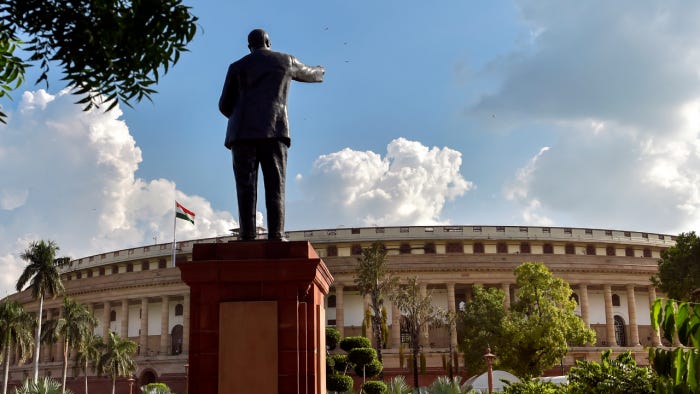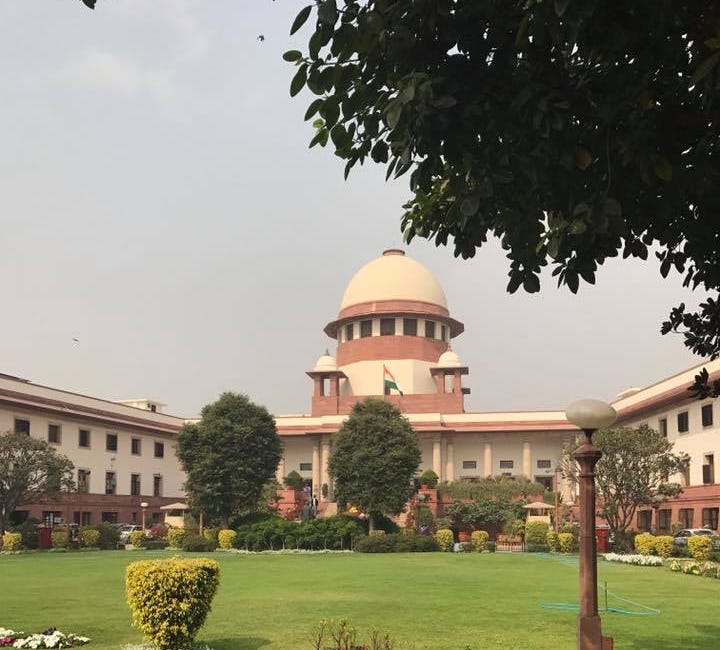Dr. B.R. Ambedkar: A Lasting Legacy and the Parliamentary Discussion in the 75th Year of the Indian Constitution
National leaders like Dr Ambedkar should be respected—even idolized—but not worshipped to the extent that their ideas are seen as infallible.
Introduction: Celebrating Ambedkar Amidst Reflection
As India celebrates 75 years of its Constitution, discussions in Parliament have rightfully focused on Dr. B.R. Ambedkar, a visionary leader and architect of modern India’s foundational document. Dr. Ambedkar’s towering intellect and commitment to social justice have made him a symbol of empowerment for marginalized communities, whose reverence for him often borders on worship. However, a closer, rational, and dispassionate examination of his contributions, particularly the system of caste-based reservations he institutionalized, reveals the paradoxical outcomes of his policies. While designed to uplift the downtrodden, these measures may have led to unintended adverse consequences, fragmenting Indian society and polity in ways that merit careful consideration.
Revisiting Ambedkar’s Legacy: A Trigger for Reflection
During the recent discussion in the Rajya Sabha commemorating 75 years of the Indian Constitution, Union Home Minister Amit Shah criticized those who, in his words, have made it “fashionable to chant ‘Ambedkar! Ambedkar! Ambedkar! Ambedkar!’” without genuinely adhering to his philosophy in its entirety. Predictably, these remarks sparked fierce protests from the Congress Party and other opposition groups, who accused Shah of insulting not just Dr. B.R. Ambedkar’s legacy but also the Constitution itself.
Be that as it may, and without delving into the rhetorical politics of the moment, the Home Minister’s pointed comments—which he steadfastly defended—have inadvertently created a much-needed platform for revisiting and reassessing Ambedkar’s policies and philosophy. With the benefit of hindsight, 75 years after the Constitution was adopted by the Constituent Assembly, this moment offers an opportunity to critically evaluate the impact and evolution of Ambedkar’s ideas, particularly in the context of the policies that have shaped India’s socio-political landscape.
Annihilation of Caste: A Radical Vision for a Casteless Society
Dr. B.R. Ambedkar’s seminal work, Annihilation of Caste (1936), stands as a defining critique of the Hindu caste system. Originally prepared as a speech for the Jat-Pat Todak Mandal, an anti-caste Hindu reformist organization based in Lahore, the conference where he was to deliver it was first postponed and eventually canceled. Undeterred, Ambedkar adapted the speech into a published pamphlet, which sparked considerable controversy amidst the backdrop of the Government of India Act, 1935, and the growing turbulence of the British Empire as it faced the rise of Hitler in Germany. In this powerful critique, Ambedkar argued that without social reforms—most importantly, the abolition of caste—political reforms would fail to achieve true equality. His subsequent conversion to Buddhism, a religion that rejects caste distinctions, was a profound personal testament to his enduring commitment to a casteless society.
The Missed Opportunity for a Casteless Society
Entrusted with the prestigious yet demanding responsibility of heading the Drafting Committee of the Constituent Assembly for framing the Indian Constitution, Dr. B.R. Ambedkar adopted a pragmatic approach. Recognizing the profound inequalities endured by marginalized communities, he introduced reservations as an enabling provision to ensure their representation in education, employment, and legislatures. These measures, originally intended as temporary and valid for only ten years, were designed to address historical injustices and create a level playing field for the oppressed.
While the abolition of untouchability and its classification as an offense punishable by law was a monumental achievement, the decision to throw open public places of worship belonging to Hindus, Sikhs, Jains, and Buddhists to all adherents, irrespective of caste, was virtually revolutionary. This provision, which struck at the core of entrenched societal norms, was not incorporated without significant resistance, yet it underscored the Constitution’s commitment to equality and social reform.
Unintended Consequences: Fragmenting Society and Polity
Perpetuating Caste Divisions
Far from erasing caste distinctions, reservations have reinforced caste identities, making them central to political and social discourse. Communities increasingly compete for inclusion in reserved categories, leading to agitations, demands, and, at times, violent confrontations.Expansion Beyond Original Intent
What began as a temporary measure has become a permanent feature of Indian governance. Through successive constitutional amendments, reservations have been extended indefinitely and expanded to include Other Backward Classes (OBCs) and additional categories, such as the Economically Weaker Sections (EWS). This has diluted the original intent of targeting the most marginalized groups, creating new layers of entitlement and rivalry.Politicization of Caste
Political parties have exploited reservations as a tool for electoral gains, entrenching caste-based politics. This approach undermines meritocracy and shifts the focus from structural socio-economic reforms to short-term electoral benefits. The inordinate debate about Caste Census is an extension of this paradigm.Erosion of Unity
The categorization of communities into SCs, STs, OBCs, and others has significantly deepened societal divides. Inter-caste rivalries and competition for limited resources have eroded the unity crucial for nation-building, turning caste into a persistent fault line in Indian society. This fragmentation has been further compounded by a recent Supreme Court verdict permitting sub-classification within the SC category to prioritize benefits for the most downtrodden and socially backward groups. While well-intentioned, this decision is likely to intensify conflicts within the SC community itself, as different sub-groups vie for higher or preferential treatment, further straining the fabric of social cohesion.
A Vision Deferred: The Dream of a Casteless Society
Ambedkar’s reservation policy, encompassing not just jobs and educational admissions but also the reservation of constituencies for members of Scheduled Castes (SCs) and Scheduled Tribes (STs), though necessary at its inception, has significantly deviated from its original purpose. Rather than fostering social equality, it has entrenched caste as a defining factor in India’s political and social fabric, perpetuating cycles of division and competition. The vision of a casteless, egalitarian society, so powerfully articulated in Annihilation of Caste, now appears more elusive than ever.
Moving Forward: Honouring Ambedkar’s Legacy
As the nation reflects on 75 years of its Constitution, it must grapple with the enduring legacy of Dr Ambedkar’s policies. While Dr. Ambedkar’s contributions as the architect of the Constitution are indisputable, it is imperative to revisit and reinterpret his vision in the context of present-day realities. The path forward involves gradually transitioning away from caste-based policies, fostering meritocracy, and prioritizing investments in universal education and economic opportunities. At the very least, an informed, rational, and dispassionate debate on these issues should not be dismissed as a “Manuvadi” mindset of the so-called privileged or higher-caste scholars, nor should we allow the demonizing of Brahmins or any other community in modern Indian society including in the Indian diaspora in the Silicon Valley. Constructive discourse is essential for achieving true equality and social harmony, and suggesting reforms in the context of a constantly evolving society.
Ambedkar and Amit Shah: A Call for Rational Reverence
Dr. Ambedkar’s contributions as the principal architect of the Indian Constitution are monumental and worthy of the highest respect. His vision for a casteless society remains a guiding light for India’s progress. However, as the nation reflects on 75 years of the Constitution, it is crucial to move beyond mere idolization and critically evaluate both his achievements and the unintended consequences of some of his policies. A constructive and rational reassessment is not an act of disrespect but a necessary step for the continued evolution of the nation, and the Republic of India.
The comments made by Union Home Minister Amit Shah during the Rajya Sabha discussions provide a timely platform for this reflection. Shah rightly criticized those who invoke Ambedkar’s name without truly understanding or following his philosophy. While his remarks drew predictable protests from the opposition, accusing him of insulting Ambedkar’s legacy and even the Constitution itself, they highlight an essential truth: reverence for national leaders must not transform into uncritical worship. Leaders, however towering, are human, and their ideas, like all human endeavors, are subject to reassessment in the light of changing circumstances and new challenges.
Interestingly, Amit Shah, who, as the National President of the BJP, previously referred to Mahatma Gandhi as a "chatur baniya" (clever trader) during a 2017 speech in Raipur, underscored the need for recognizing leaders’ strengths while being open to discussing their limitations. His comment was not intended to diminish Gandhi ji’s stature but to highlight his strategic acumen. Similarly, acknowledging the paradoxes in Ambedkar’s policies or offering counter-narratives should not be denounced as blasphemous or an attack on his legacy. A rational, informed, and dispassionate debate is essential for the nation to grow and reconcile competing ideas.
Dr Ambedkar’s introduction of caste-based reservations was a bold and pragmatic response to the historical injustices faced by marginalized communities, for centuries together. However, over time, the system has deviated from its original intent of being a temporary measure to level the playing field. Instead, it has entrenched caste divisions, fostered inter-caste rivalries, and made caste a persistent fault line in Indian society. Expanding reservations to new categories through constitutional amendments and recent moves like sub-classifications within SCs have further complicated the framework, creating newer conflicts among subgroups.
Amit Shah’s call to revisit, or at least reinterpret, Ambedkar’s philosophy resonates in this context. National leaders like Dr Ambedkar should be respected—even idolized—but not worshipped to the extent that their ideas are seen as infallible. The challenge is to honour his dream of a casteless society while addressing the realities of caste-based policies’ long-term impacts. To truly honour his legacy, India must focus on fostering meritocracy, investing in universal education and economic empowerment, and gradually transitioning away from caste-based frameworks.
As the nation moves forward, it must balance its commitment to social justice with the need to transcend caste divisions. Notably, even in the United States, the Diversity, Equity, and Inclusion (DEI) movement is facing growing criticism for its unintended consequences, highlighting the global challenges of addressing systemic inequalities without creating new divisions. National leaders’ legacies should inspire critical engagement rather than unquestioning veneration. Only through this approach can the Republic fulfill its promise of equality, unity, and justice for all.
Landmark Supreme Court Judgment on Sub-Classification of Scheduled Castes
Sub-Classification of Scheduled Castes Permissible






